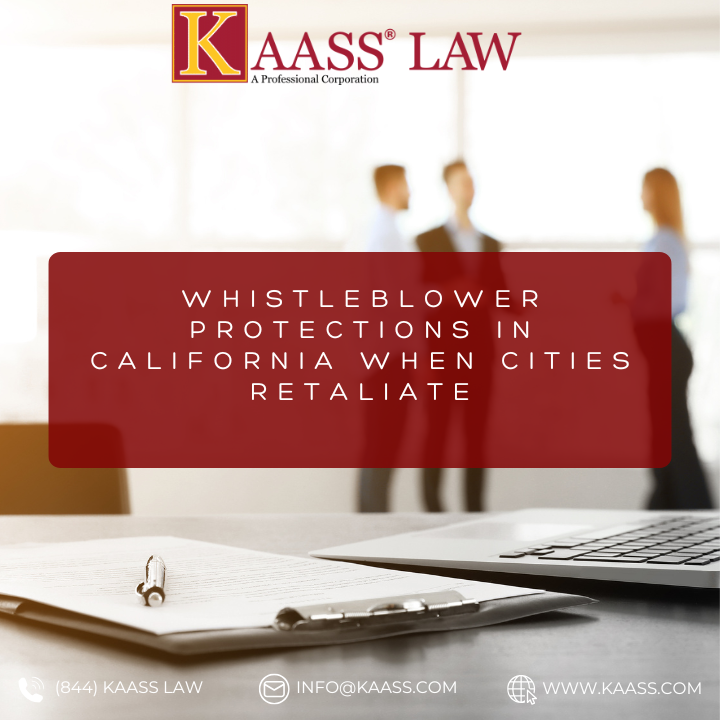Speaking Up Against Fraud in Local Government
When a public employee in California exposes fraud that drains millions of taxpayer dollars, city officials do not always respond with gratitude. Instead of rewarding honesty, some cities fire the employee or make the workplace unbearable. Their goal is clear: silence the whistleblower and warn others not to speak up.
California lawmakers know retaliation happens often when employees report misconduct. To address this problem, the state created strong whistleblower protections that let employees fight back. These laws give workers the power to challenge retaliation and recover damages.
Whistleblower Retaliation
California Labor Code §1102.5 provides the strongest legal protection for whistleblowers. This statute forbids employers from retaliating against employees who report reasonably suspected violations of law. The report can be made externally to government agencies or internally to supervisors within the organization.
Fraud, embezzlement, and other forms of corruption in city government fall well within the scope of this law. Employees stay protected even if investigators never confirm a violation, as long as they reported their concerns in good faith.
The remedies available under this law are extensive. A whistleblower who proves retaliation may be entitled to reinstatement to their job, payment of lost wages and benefits, compensatory damages, and, in some cases, civil penalties. Courts recognize this statute as one of the strongest protections available to California employees because it provides meaningful recourse for those who risk their careers by exposing wrongdoing.
California Whistleblower Protection Act for Local Government Employees
In addition to Labor Code protections, California has a dedicated law designed for city and county workers. Government Code §53296 prohibits retaliation against local government employees who disclose waste, fraud, or violations of law. The statute exists to ensure accountability within municipalities and counties, where misuse of funds can have an immediate impact on communities.
For state employees, Government Code §8547, known as the California Whistleblower Protection Act, provides a parallel safeguard. Together, these statutes make clear that employees in the public sector should not fear retaliation when they act in the public’s best interest by exposing fraud or abuse of authority.
First Amendment Retaliation
Whistleblowers also have potential remedies under the United States Constitution. Through 42 U.S.C. §1983, employees can bring a First Amendment retaliation claim if their protected speech on a matter of public concern led to punishment or termination.
Exposing fraud, corruption, or misuse of public funds is clearly a matter of public concern. However, the claim requires that the speech be made as a citizen rather than as part of official duties. The Supreme Court decision in Garcetti v. Ceballos (2006) narrowed protections by holding that speech made pursuant to job responsibilities is not protected. Still, if an employee steps outside of their role and speaks publicly as a citizen, the First Amendment may apply.
Wrongful Termination in Violation of Public Policy
California courts allow employees to bring a wrongful termination claim when an employer fires them in violation of fundamental public policy. This type of case is often referred to as a Tameny claim, based on a landmark California Supreme Court case.
Public policy strongly favors honesty, integrity, and the reporting of fraud. A city that terminates an employee for refusing to participate in misconduct or for exposing corruption violates this policy. Courts take a strict view of such actions, often siding with the employee when evidence shows retaliation for standing against unlawful conduct.
Federal False Claims Act and Qui Tam Protections
If the fraud involves federal funds, such as grants or federally supported programs, the federal False Claims Act becomes relevant. This law allows whistleblowers to file lawsuits on behalf of the federal government, known as qui tam actions, to recover misused taxpayer dollars.
The False Claims Act protects whistleblowers from retaliation and lets them claim a share of the recovered funds when a lawsuit succeeds. Courts often award whistleblowers 15 to 30 percent of the total recovery, which creates a strong incentive for individuals to step forward when others steal or waste federal money.
Additional Protections and Possible Claims
Whistleblower retaliation rarely occurs in isolation. Often, employees face a combination of unfair treatment and additional unlawful actions. Potential supplemental claims include:
- Defamation and Blacklisting: If the city spreads damaging falsehoods or interferes with future job opportunities, employees may sue for reputational harm.
- Other Anti-Retaliation Statutes: Depending on the type of fraud exposed, other state or federal laws may apply. Examples include environmental whistleblower statutes, securities fraud protections, and safety-related statutes.
- Emotional Distress Claims: Employees who endure harassment, intimidation, or public humiliation may seek damages for the emotional toll.
How KAASS LAW Can Help
At KAASS LAW, we know how difficult it is to stand up against a powerful city or government employer. Whistleblowers who expose fraud are doing more than protecting themselves; they are protecting the integrity of public institutions and the taxpayers who fund them.
Our attorneys understand the full range of legal claims that may apply, from state whistleblower statutes to federal False Claims Act protections. KAASS LAW fights to win reinstatement, recover lost wages, and hold employers accountable when they punish clients for doing the right thing.
If you or someone you know has faced retaliation after reporting corruption or fraud, you do not have to fight alone. Contact us today to discuss your options and your rights. Call KAASS LAW, leave it to us.

